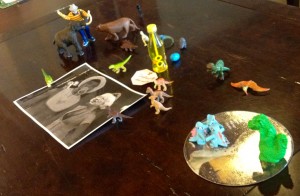
Kurt Vonnegut, Jr. – Vonnegut is the best of the best, and I don’t just say that because he’s a fellow Hoosier. Welcome to the Monkey House is a great collection to start with and one that I read over and over in high school, but I’m also fond of Look At the Birdie, published posthumously.
Carol Emshwiller – Also amazing, also doing things so skillfully that plain language manages to become part of such a lovely construction that the grain of the words seems ornamental as well as story material. I just love Emshwiller, and getting to publish one of her short stories during my time at Fantasy Magazine was a highlight. I particularly recommend I Live With You and Report to The Men’s Club.
James Tiptree Jr. – For some of the most wonderful titles around, for some of the most subversive and interesting spec fic ever, look no further than Tiptree, aka Alice Sheldon, who shaped the field to the point where they named an award after her. Her Smoke Rose Up Forever and Brightness Falls From Air are both good starting points. (Julie Phillip’s biography, James Tiptree, Jr.: The Double Life of Alice B. Sheldon, is a fascinating read that brings even more to the stories.) And the award anthologies are FULL of good stuff that shows some of the best in the field.
Philip K. Dick – Dick does ideas, and amazing ones, but he’s also a really solid writer. Start with the volume edited by Jonathan Lethem, Selected Stories of Philip K. Dick. Like Tiptree, this is one of the people who didn’t just subtly shape the field of spec fic but banged their name into the side of it with a sledgehammer.
Donald Barthelme is one of the writers that falls into the literary side of things, but spec fic readers that like slipstream will find him well suited to their tastes. Sixty Stories should be sitting on your shelf.
Grace Paley is also literary, but holy cow, just go buy her three slim little books of fiction (which is all we have, sadly) and read them. Enormous Changes At the Last Minute, The Little Disturbances of Man, and Later the Same Day are the titles. Having Grace at my dinner table asking for a second helping of the pumpkin cheesecake and warning us all that at some point of the meal her false teeth might fly out of her mouth and that if that happened, the last thing she wanted was for anyone to pretend it hadn’t happened, was one of the greatest moments of my time at Hopkins.
O. Henry is a classic, prolific short story writer. Some stories have aged better than others, but going through his collected works is a good use of time for a short story writer. Three things he’s good at: plot construction, pulling on the heart strings, and dialogue.
Joan Aiken did more than write some great YA fiction. She’s also got a ton of good short stories. Many are adult, but The Serial Garden, which contains all her Armitage family stories, is full of good fantasy.
Theodore Sturgeon was prolific and has done some amazing speculative stories t. The nice thing if you’re a bibliophile is that North Atlantic Press does a complete edition of his short stories (which I covet and wouldn’t mind for Christmas if any spouses named Wayne are reading this), starting with Volume I, The Ultimate Egoist.
James Thurber is another writer that I hit in high school and who I read over and over. His letters are actually one of the books that shaped my life: his good humor in the face of adversity shines in them. Flash fiction admirers should check out Fables for My Time.
Enjoy this writing advice and want more like it? Check out the classes Cat gives via the Rambo Academy for Wayward Writers, which offers both on-demand and live online writing classes for fantasy and science fiction writers from Cat and other authors, including Ann Leckie, Seanan McGuire, Fran Wilde and other talents! All classes include three free slots.
Prefer to opt for weekly interaction, advice, opportunities to ask questions, and access to the Chez Rambo Discord community and critique group? Check out Cat’s Patreon. Or sample her writing here.










4 Responses
Great list, Cat!
Here are a few of my favorites: Ted Chiang, Jeffrey Ford, Barry Lopez, Aimee Bender, Maureen McHugh, and Jay Lake. You’re also on my list.
I’m not sure Ted Chiang is someone to study. I’m not certain mortals can recreate what he does. I’m also not sure I would want to write a Ted Chiang style story because they do seem to be a signature. However, his works are a joy to read and feel like a discovery every time. Every story is like a sky scrapper. A beautiful work of art and engineering. Right now, I just want to make a bird-feeder or a dog house.
Jeffrey Ford’s works definitely fit in that world between speculative and literary. They aren’t always structurally satisfying, but the characters always seem to have a natural reality to them. Also a good one to read for prose. I think Ford was one of the first writers I discovered that made me realize fantasy was more than just D&D fan fiction. After reading him I started taking fantasy seriously as a genre.
Barry Lopez’s works are probably lesser known. He has a few works that are more magical realism than speculative, but still a joy to read. This one is definitely more on the literary side though.
Aimee Bender is just amazing. Also more literary, but the way her stories flow and feel so natural makes them a fun read. She also has a real compassion for her characters, something I’d like to capture in my own works.
Maureen McHugh is in my opinion the go-to writer for character. Her stories are almost always all character–they have a plot, but they almost don’t need it. She captures voice like no one I’ve ever read. I would also consider her a bit more literary, but her stories tend to be in speculative anthologies and magazines.
Jay Lake is just awesome. This guy has more world building skills in the tip of his pinky finger than most people will ever develop over a lifetime. And these skills come out in the prose and characters. I love his shorter works and have just started appreciating his novels. Jay is both a heroic figure on the page as an author and in real life.
I’m certain you’ve read most of these, but thought I would throw them out there as part of the conversation.
Roald Dahl is near the top of my list.
For myself, I’d add Tobias Wolff to the list, altho he’s not speculative fiction and I also do understand that his stuff is not going to appeal to everyone. And, needless to say (?), these are generally not happy stories. (In fact, as I recall, they never are.) But I think he’s a master craftsman. “Bullet in the Brain” — about a man getting shot — does more in 6 pages than I’ve read in entire books.